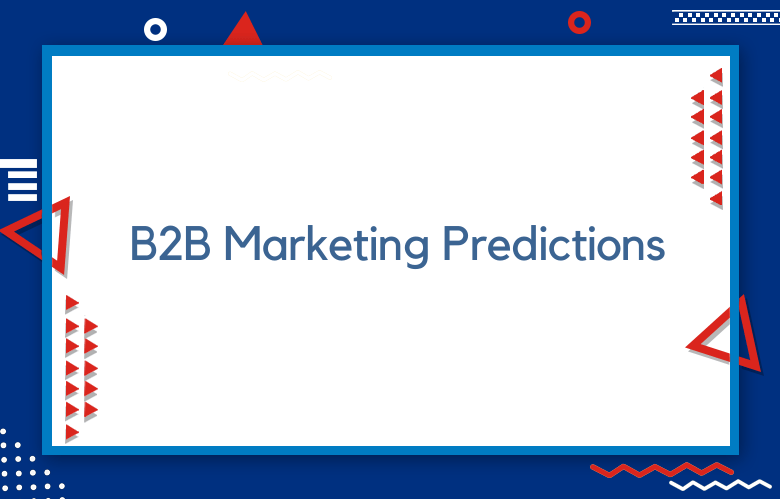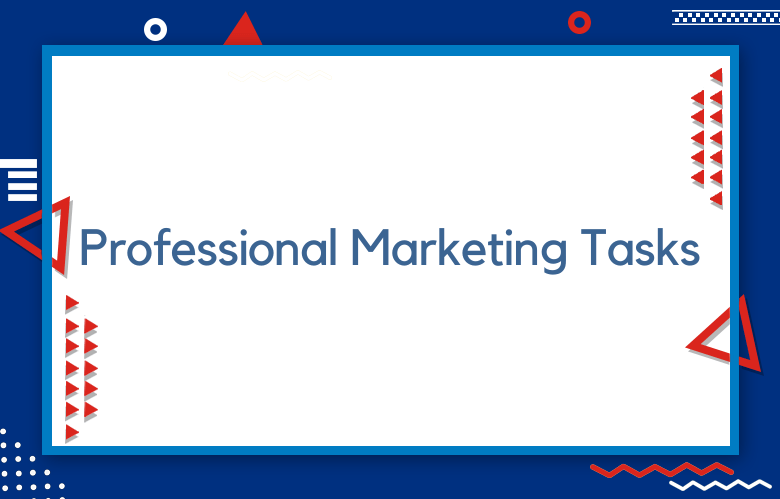Top B2B Marketing Predictions for 2024

As we look ahead to 2024, the landscape of B2B marketing continues to evolve rapidly, influenced by technological advancements, changing consumer behaviors, and economic factors. Brands are poised to adopt more sophisticated strategies to stay competitive and relevant.
Top B2B Marketing Predictions for 2024
From the rise of AI-driven personalization to an increased focus on sustainability and ethical marketing, the strategies businesses employ are becoming more nuanced and data-driven. Additionally, the integration of new technologies and platforms is expected to reshape how companies engage with their business clients and partners.
This introduction will delve into the top predictions for B2B marketing in 2024, highlighting the key trends that marketers should be aware of to effectively navigate this dynamic environment.
Bold BMarketing Predictions Shaping 2024
As we approach 2024, the B2B marketing landscape is poised for dramatic shifts fueled by rapid technological advancements and evolving business needs. Predictions suggest a year defined by bold strategies where data-driven decision-making, personalized marketing through AI, and an emphasis on sustainability and ethical practices will dominate.
These trends reflect a broader move towards more integrated, responsive, and responsible marketing approaches that align closely with customer values and expectations. This introduction will unpack the key predictions shaping B2B marketing in 2024, offering insights into how marketers can leverage these trends to forge stronger connections with their audiences and achieve competitive advantages in their industries.
The Future of BMarketing: Trends to Watch
As we look into the future of B2B marketing, several emerging trends are poised to shape the landscape significantly. Here are some key trends to watch:
Increased Use of AI and Machine Learning: Artificial intelligence is becoming a cornerstone of B2B marketing strategies. AI can analyze data at scale to personalize marketing efforts, predict customer behavior, and optimize campaign performance in real-time.
Focus on Customer Experience (CX): The emphasis on enhancing customer experience is stronger than ever, with companies investing in technology and strategies that streamline the buyer’s journey, making it more personalized and responsive.
Integration of Sales and Marketing: The lines between sales and marketing are blurring. Successful companies are increasingly integrating these functions to create a seamless customer interaction process, leveraging shared data and insights to drive conversions.
Sustainability and Ethical Marketing: As global concerns about sustainability grow, businesses are not only promoting their products but also their corporate values. B2B buyers are looking to partner with companies that demonstrate responsibility towards the environment and society.
Expansion of Content Marketing: Content remains king, but the focus is shifting towards more engaging, interactive content such as videos, podcasts, and interactive webinars that can hold the audience’s attention and provide value.
Advancements in Data Privacy: With increasing regulations like GDPR and CCPA, B2B marketers will need to be more transparent in how they collect, store, and use data. Trust and compliance will become key competitive differentiators.
Rise of Account-Based Marketing (ABM): ABM will continue to evolve with more personalized and strategic approaches to target key accounts, using AI to scale personalization effectively.
Social Media for B2B: Platforms like LinkedIn will continue to be pivotal in B2B marketing strategies, but other social networks will be increasingly important as channels for reaching and engaging professional audiences.
Voice and Visual Search Optimization: As voice search devices and visual search technologies gain traction, optimizing content for these search inputs will become an essential part of B2B marketing strategies.
Increased Focus on Analytics and Measurement: With the wealth of data available, analytics will become more sophisticated, with metrics evolving beyond leads and clicks to deeper insights into engagement, customer satisfaction, and lifetime value.
These trends reflect the dynamic nature of B2B marketing and the need for businesses to stay agile, informed, and ready to adopt new technologies and strategies to remain competitive in a rapidly changing environment.
Predicting the Next Big Moves in BMarketing for 2024
As we approach 2024, the landscape of B2B marketing is poised for transformative changes. Businesses are increasingly recognizing the necessity to adapt to rapid technological advancements, shifting market dynamics, and changing customer behaviors. This introductory overview sets the stage for discussing the emerging trends and strategies that are expected to dominate B2B marketing in the coming year.
From the integration of cutting-edge technologies such as AI and machine learning to a deeper focus on data-driven personalization and customer experience, B2B marketers will need to innovate continually to stay ahead. The following sections will delve into these trends in detail, providing insights into how companies can leverage them to drive growth and maintain competitiveness in an increasingly digital world.
Revolutionizing BMarketing: Forecast for 2024
As we move into 2024, B2B marketing is on the cusp of a revolution driven by rapid technological innovations and shifts in global business practices. This year is expected to bring transformative changes, with companies increasingly leveraging advanced technologies such as artificial intelligence, machine learning, and big data analytics to enhance customer engagement and streamline marketing processes.
The growing emphasis on sustainability and ethical practices is pushing brands to rethink their strategies and align more closely with the values of their customers and communities. This introduction will explore the major forecasts for B2B marketing in 2024, highlighting how these new trends and technologies are set to redefine the ways businesses interact with their clients and reshape the marketing landscape.
Navigating the Landscape: Top BMarketing Predictions for 2024
As we navigate into 2024, the B2B marketing landscape is set to evolve with new trends and challenges that will shape strategies and operations. Here are some top predictions that highlight what professionals in the field should be prepared for:
Greater Integration of AI and Automation: AI and automation will play even larger roles in B2B marketing, particularly in data analysis, customer segmentation, and personalized marketing campaigns. These technologies will help marketers be more efficient and effective in targeting the right audiences with tailored messages.
Emphasis on Customer Experience (CX): There will be a heightened focus on improving the customer experience, making it seamless across various digital platforms. Businesses will invest in technologies and strategies that enhance interaction points throughout the customer journey to increase engagement and satisfaction.
Increased Use of Account-Based Marketing (ABM): ABM will continue to grow as marketers strive to create more customized experiences that resonate with high-value accounts. This approach helps align marketing and sales efforts, thus improving conversion rates and ROI.
Rise of Content-Driven Strategies: Content marketing will remain crucial but will evolve to include more interactive and engaging formats such as videos, webinars, and dynamic case studies. Content will be used not just for lead generation but also for positioning companies as thought leaders in their industries.
Sustainability as a Core Component: More companies will incorporate sustainability into their core marketing strategies. This shift is driven by increasing consumer and corporate demand for environmental and social responsibility.
Privacy and Data Security: With stricter data privacy laws and regulations expected to be in place, B2B marketers will need to prioritize data protection and transparency. This will involve adopting new data management practices that respect customer privacy while still allowing for personalized marketing.
Enhanced Analytics and Measurement Tools: As data becomes more central to B2B marketing strategies, the use of advanced analytics tools will increase. These tools will help marketers measure effectiveness more accurately and make data-driven decisions to optimize their strategies.
Vision: Key BMarketing Predictions Unveiled
As we look toward 2024, the vision for B2B marketing is clear: it’s set to be more dynamic, interconnected, and technologically sophisticated than ever before. The key predictions for the year revolve around leveraging advanced technologies and deeper data insights to enhance decision-making and operational efficiency. We’ll see an increased emphasis on personalized marketing strategies that are not only data-driven but also adaptable to the shifting preferences and behaviors of business customers.
Artificial intelligence (AI) will become an indispensable tool, enabling real-time customer insights and facilitating predictive analytics for better targeting and customer journey optimization. Moreover, the integration of AI with other technologies like IoT and blockchain will enhance the security and efficiency of transactions and data exchanges in the B2B realm.
Conclusion:
The top B2B marketing predictions for 2024 anticipate significant changes influenced by technological advancements, evolving customer expectations, and a shifting economic landscape. Key trends include a stronger emphasis on personalized marketing driven by AI and data analytics, increased investment in digital channels as businesses continue to favor online interactions, and a heightened focus on sustainability and corporate responsibility in marketing strategies.
Moreover, the integration of AI tools is expected to revolutionize customer engagement and content creation, making interactions more tailored and efficient. Companies that adapt to these trends, prioritize flexibility in their marketing strategies, and leverage new technologies will likely find themselves at a competitive advantage.
Call: +91 9848321284
Email: [email protected]



